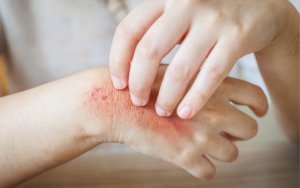
The saliva of blood sucking creatures such as ticks, mosquitoes and leeches contain a substance that prevents blood clotting while they feed on their hosts. A recent study conducted by researchers of Duke University found a mechanism to develop a potential alternative to heparin. It is a common anticoagulant. Healthcare professionals use this anticoagulant while performing angioplasty, dialysis and surgeries.
This study was published in the journal Nature Communications. In this study, researchers found a synthetic molecule that works similarly to the substance found in the saliva of blood-sucking creatures. This molecule also reverses its anti-clotting effect very quickly. This ability allows normal clotting to resume when necessary.
The researchers of this study found that these blood-sucking creatures have two-step processes. First, they release an anti-clotting agent that binds to certain proteins in the host’s blood. Then it enters the core of the protein to stop clotting for a short time while these creatures suck blood.
In this study, researchers mainly focused on specific blood clotting agents such as thrombin and factor Xa. Their synthetic molecule showed a dual-action anti-clotting effect and worked effectively against these proteins. Then researchers tried to find out how to reverse this process. The researchers found an antidote after understanding the activation mechanism. This antidote promptly stopped the bleeding.
Researchers of this study think that this method might be safe and does not pose the risk of inflammation. As the molecule is synthetic, it does not require heparin. Heparin is obtained from the intestines of pigs and this process requires a large-scale infrastructure. This increases pollution and greenhouse gases. So, this method can be a potential alternative to animal-derived heparin.
As the research shows this synthetic molecule can be used as an alternative to heparin, healthcare professionals should use this molecule while performing surgeries, angioplasty and dialysis.
Reference link:
Haixiang Yu et al, Aptameric hirudins as selective and reversible EXosite-ACTive site (EXACT) inhibitors, Nature Communications (2024).












